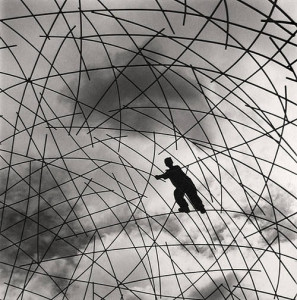The following text under the title “Breaking the isolation” is a contribution by anarchist comrade Alfredo Cospito for the first issue (#0) of the Anarchist Black Cross magazine[Italy].
It is with difficulty that our words come out uncensored from the four walls of this prison. At times, however, we manage to break the isolation. We are seizing the opportunity to have a say on the new Black Cross, a project born here inside, during out-of-cell time.
Very often over recent years, there was a surrender to whining, to victimization born of anticipation· anticipation of the next “safeguarding line”, of the slogan shouted, all insufficient substitutes of the destructive action. Ever since the first days of our imprisonment, on the contrary, we have been full of optimism, a feeling which is not only ours, but is also shared with some of our fellow inmates. Optimism concrete, made by different perspectives which together in their diversity, they will succeed in defeating that “realism”, that endless, unbearable, sterile leaning towards the “social”, which has repressed so many arms. The obsessive fear of making a bigger step, so as not to scare away the “crowd”. The obsessive fear of taking an action too “violent”, out of worry that the flock might run away. I am sure that the new editorial project of Black Cross will manage to penetrate among several comrades committed to action, to the destructive attack.
For many years some of us feel the need of a place, a physical space, a magazine where different perspectives and visions of anarchism in action can be compared, without dogmas, each one through its own certainties and doubts. Black Cross should be that place. My position and Nicola’s at Genova was clear. Clearly, I have stated that I believe in the efficiency of the informal project of FAI-FRI, which is only one of the various components of the wider Black International. I am convinced that if actions should communicate and disperse, they have to be accompanied by a message, a responsibility claim, and that this communication between groups through responsibility claims is the real informal organization, of which many fill up their mouths reducing it to a complicated abstraction. This is the only way to by-pass the decision-making assemblies and deprive various anarchist leaders/pacifiers of “authority”.
This is only my conviction, one of the visions I hope that can be confronted and, why not, crammed between the pages of Black Cross. A room of theoretical exercise that i hope, given time, will succeed in getting rid of the unbearable burden of a pietistic*[1]social vision that is turning many anarchists in laic priests*[2], always driven by the last pitiful case. Like militant whirligigs, bouncing from one “battle” to another, without ever being truly incisive, without ever being violent enough. In conclusion, me and Nicola would like a journal, made by comrades that, while having completely different projects from ours, they are not limited to flirting with the on-duty “losers”, which are the usual detainees or immigrants, since such a political approach creates paternalism placing us above “categories” we defend, and transforming us into vanguard, de facto. Comrades with different perspectives, but united by a certainty that, in our opinion, should be indispensable for them to adhere to this editorial project, certainty that words are empty if not accompanied by facts, and facts are uniquely the destructive actions of attack. Because the rest is politics and it disgusts us.
Alfredo Cospito
–
Translated by Inter Arma
–
*[1] Pietistic. adjective./ Pietism – A reform movement in the German Lutheran Church during the 17th and 18th centuries, which strove to renew the devotional ideal in the Protestant religion.
*[2] Laic. adjective./ Of the laity; secular; lay. also laical. Origin of laic. Ecclesiastical Late Latin laicus, not priestly ; from Classical Greek laikos.
